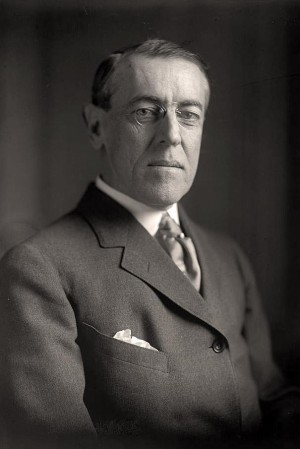Woodrow Wilson (Thomas Woodrow Wilson)

Woodrow Wilson
28th US President, 34th New Jersey Governor, Nobel Peace Prize Winner. He is best remembered for keeping America neutral at the start of World War I, but reluctantly entering the war in 1917, joining the Allied Powers, primarily Britain and France, to defeat the Central Powers led by Germany, Austria-Hungary and the Ottoman Empire, and for creating the League of Nations, intended to help preserve territorial integrity and political independence among all nations after the end of World War I. He strongly advocated antitrust laws and was a staunch supporter of voting rights for women. Born in Virginia, his parents had moved there in 1851 where his father was one of the founders of the Southern Presbyterian Church after it had split from the northern Presbyterian Church at the beginning of the Civil War. He did not learn to read until past the age of ten, which may have been attributed to dyslexia. He spent most of his childhood in Augusta, Georgia where his father, who was pro-slavery and had owned slaves, was the minister of the Presbyterian Church. In 1873 he attended Davidson College near Charlotte, North Carolina for a year but did not return for health reasons. His father then secured a teaching position at Princeton University, Princeton, New Jersey, and he resumed his college instruction, graduating in 1879. He then attended law school for a year at the University of Virginia at Charlottesville, Virginia but withdrew again for health reasons and returned to his home in Wilmington, North Carolina and resumed his law studies. In January 1882 he began a law practice in Atlanta, Georgia, passing the Georgia bar in October of that year. In the autumn of 1883 he began studying for his doctorate in history and political science at Johns Hopkins University, completing his PhD with dissertation three years later. In 1885 he married Ellen Louise Axson, the daughter of a minister from Savannah, Georgia and by 1889 three daughters were born. In 1890 he joined the faculty at Princeton University as a professor of jurisprudence and political economy and in 1902 the university trustees promoted him to president. During his time, he was able to secure additional funding for new facilities and curriculums, increased salaries, and a natural history museum and increased its faculty by more than 60. In 1910 he decided to leave his position due to ongoing social conflicts with the university trustees and alumni, and enter New Jersey State politics. He ran for state governor in 1910 as a Democrat and defeated the Republican candidate Vivian M. Lewis. He immediately established reforms, including the establishment of state primaries, overhauled the public utility commission, and introduced worker’s compensation. His popularity as governor along with the national media status gave him the springboard to run as the Democratic candidate for US President in 1912 and he defeated the Republican incumbent President William Howard Taft in the general election. In 1913 he became the first president to deliver the State of the Union address since 1801 and held the first modern presidential press conference on March 15, 1913, that permitted reporters to ask him questions. The following year, his wife died and in 1915, he met and married Edith Bolling Galt. During his first term as president, he persuaded Congress to pass major reforms, to include the Federal Reserve Act (1913), the Underwood Tariff Act (1913), the Clayton Antitrust Act (1914), the Smith-Lever Act (1914), the Federal Farm Loan Act (1916), the Adamson Act (1916), and the Keating-Owen Act (1916), but was declared unconstitutional by the Supreme Court in 1918). When World War I broke out in Europe in 1914, he kept America neutral in the conflict, in spite of the sinking of the British passenger ship RMS Lusitania in May 1915 by a German submarine with American citizens on board. In 1916 he was renominated as the Democratic candidate for president and narrowly won the election over the Republican candidate, Charles Evans Hughes. However, with Germany’s program of unrestricted submarine warfare in early 1917, coupled with their attempt to enlist Mexico as an ally against America, he broke from his neutrality stance and declared war on Germany on April 2, 1917, which was passed by Congress two days later. He pushed for passage of the Espionage Act (1917) and the Sedition Act (1918) to suppress opposition to the war at home. Additionally, the passage of the Immigration Act (1918) gave him further powers to deport foreign immigrants who opposed America’s participation in the war. After Germany surrendered on November 11, 1918, he traveled to Paris, France for the Peace Conference, spending six months there to help develop the Treaty of Versailles. His idea of the League of Nations (made famous in his “Fourteen Points” address to Congress on January 8, 1918) was incorporated into the treaty and he was awarded the 1919 Nobel Peace Prize for his efforts. After returning to the US, he began a cross-country speaking tour in September 1919 to elicit support for the treaty. During his tour, he suffered several debilitating strokes and was forced to cancel his trip. Returning to the White House, he became an invalid for the rest of his term and, with few exceptions, was kept out of the presence of his vice-president, his cabinet, and Congressional visitors. His wife, Edith, closely monitored and controlled his actions. The Treaty of Versailles was never ratified by Congress and the US never joined the League of Nations. After his second presidential term was over, he maintained his residence in Washington DC. He died from a stroke and is the only US President to have been buried in Washington DC.
Born
- December, 28, 1856
- Staunton, Virginia
Died
- February, 03, 1924
- Washington, D.C.
Cause of Death
- died at home of a stroke and other heart-related problems
Cemetery
- Washington National Cathedral
- Washington,District Of Columbia


